Truck Refrigeration Unit Market Insights, 2032
The global truck refrigeration unit market size was estimated at USD 12,682.3 million in 2022 and is estimated to reach USD 22,997.7 million by 2032, exhibiting a CAGR of 6.3% from 2023 to 2032.
Report Key Highlighters:
- The truck refrigeration unit market study covers 14 countries. The research includes regional and segment analysis of each country in terms of value ($million) for the projected period 2023-2032.
- The study integrated high-quality data, professional opinions and analysis, and critical independent perspectives. The research approach is intended to provide a balanced view of global markets and to assist stakeholders in making educated decisions in order to achieve their most ambitious growth objectives.
- Over 3,700 product literature, annual reports, industry statements, and other comparable materials from major industry participants were reviewed to gain a better understanding of the market.
- The truck refrigeration unit market share is fragmented into several players including Advanced Temperature Control, Carrier, Daikin, Denso, Mitsubishi Heavy Industries, Klinge Corporation, Subros, Thermo King, Utility Trailer Manufacturing Company, and Webasto Group. The companies have adopted strategies such as product launch, product development, and others to improve their market positioning.
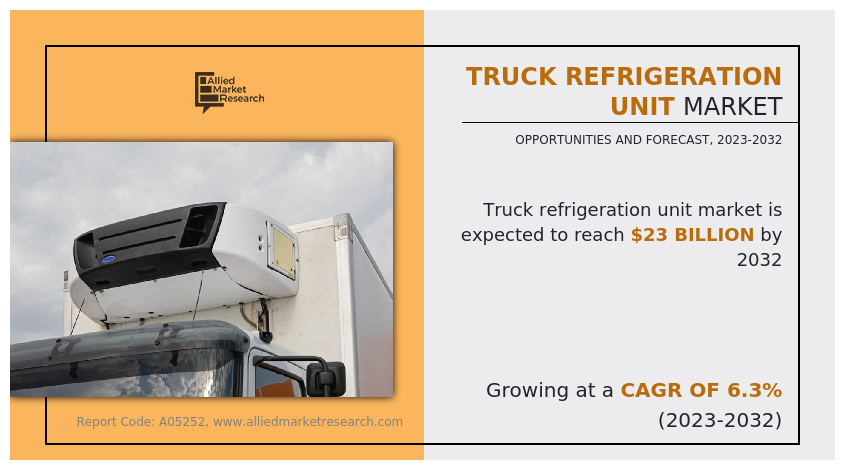
A truck refrigeration unit is designed to create and maintain an environmentally controlled temperature within the cargo area of road vehicles. These units are primarily used for transporting perishable goods- like food (including frozen), pharmaceuticals, or other temperature-sensitive products and maintaining their quality and freshness through the duration of shipping. These units are crucial to industries that need goods delivered within a particular temperature range. These typically include the refrigeration system, compressor, and temperature control mechanisms. Inside the cargo space, one can use different refrigeration technologies such as compression refrigeration to chill and maintain a suitable temperature.
The global truck refrigeration unit market is growing due to the increasing use of temperature-controlled transportation especially in life sciences, pharmaceuticals, and foods. With these industries becoming more and more globalized, the demands for stable refrigeration wherever goods are distributed also increase. Moreover, strict environmental regulations and increased emphasis on sustainability are driving market players to design environmentally friendly refrigeration units consuming less energy. In response to the need for companies to reduce their carbon footprint as well as environmental standards, combining advanced technologies like electric and hybrid refrigeration systems is becoming mainstream. Not only does this move toward sustainability conform with environmental protection regulatory requirements but is also in step for the industry as a whole to pursue greener methods of doing business.
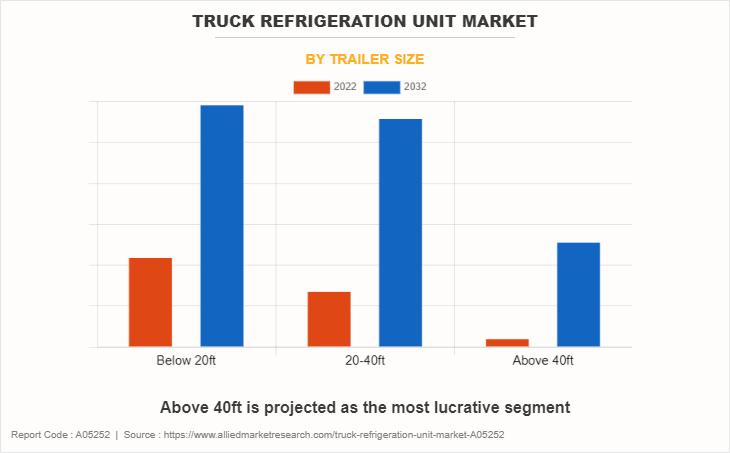
Additionally, the digital transformation of transportation and logistics is an important factor influencing the market for truck refrigeration units. Temperature-sensitive cargo can be monitored and controlled in real-time by incorporating smart technologies like IoT (Internet of Things) and telematics. This not only saves the integrity of what is being transported, it also increases overall operating efficiency. These systems present data-driven insights that allow fleet managers to optimize routes and reduce fuel consumption, actively solve maintenance problems--thus contributing to the widespread adoption of high end refrigeration equipment.
The global truck refrigeration unit market is segmented into type, trailer size, end-user, and region. Depending on the type, the market is segregated into roof mount and split. By trailer size, it is categorized into below 20ft, 20-40ft, and above 40ft. As an end-user, it is fragmented into food, pharmaceutical, chemical industry, and others. Region-wise, the market is analyzed across North America, Europe, Asia-Pacific, and LAMEA.
Due to an expansion in Asia-Pacific's logistics and transportation industries brought about by an unprecedented wave of e-commerce activity, combined with industry upgrading through supply chains going global, this region takes a commanding lead over every other geographic market for truck refrigeration units. With consumers relying more and more on online shopping, a corresponding increase exists in the need for cold chain machinery that can transport goods quickly and reliably to maintain their freshness. Moreover, strict international transportation regulations and standards regarding temperature-sensitive goods--including pharmaceuticals and food products exacerbate this trend toward advanced truck refrigeration unit market trends in the Asia-Pacific region. This emphasis on maintaining the cold chain integrity has prompted businesses to invest in advanced refrigeration technologies. For example, in February 2021, the Food Safety and Standards Authority of India established strict requirements for transporting perishable goods under the “Safe and Hygienic Transport of Meat and Fish Products Regulations”.
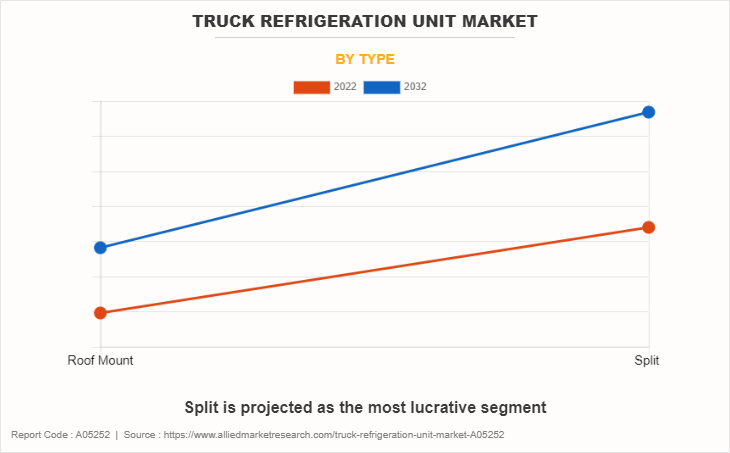
While India dominates the market, other countries in the region, such as China and Southeast Asian nations, also present substantial growth opportunities. Despite China’s huge population and burgeoning logistics industry, it is still a major force on the market. The economic boom and rising middle class in Southeast Asian countries help the entire region expand its market. Ashok Leyland, one of the key players in India’s trucking industry provides a wide range of commercial vehicles, including those fitted with refrigeration units to serve cold chain transportation. Likewise, Tata Motors is a major domestic manufacturer of automobiles in India, and has long been active on the truck refrigeration unit market. The company offers a variety of commercial vehicles, including refrigerated trucks, meeting the rising demand for cold chain logistics.
For instance, in January 2021, Tata Motors introduced a new series of refrigerated trucks to ensure easy flow for the national COVID-19 vaccination campaign. Similarly, in Tata Motors, the new range of vehicles has been developed in line with temperature, volume, and weight requirements. The vehicles are offered in many different tonnage points and capacities, including 20 cuM and 32 cuM refrigerated trucks for the Intermediate Commercial Vehicle (ICV) class, as well as insulated vans in ICVAs and MCVA segments.
Increase in Demand for Advanced Temperature Control and Monitoring Systems in Trucks
With the increasing shipment of temperature-sensitive goods, such as pharmaceuticals, fresh produce and other perishables, there is a rising demand for reliable and advanced temperature management solutions. Today reef trucks are designed especially for handling refrigerated cargo and need advanced techniques to guarantee that fragile goods will remain preserved at every step of the supply chain. This highly sophisticated system not only keeps the temperature optimum but is also equipped with real-time monitoring functions so that companies and customers can track their cargo at any time along its journey. The regulatory requirements and the realization of temperature control are all promoting these developments.
With the industry moving onward and upward, the fact is that those who operate reef trucks must invest in cutting-edge temperature control and monitoring devices for their vehicles--it's increasingly an objective reality. For example, ATC Truck Refrigeration has a leading-edge temperature control that provides direct drive van and truck refrigeration. As with the refrigerating shock prevention system in cars, Denso also provides Refrigerator Monitoring Service D-FAMS which allows users to monitor and manage remotely reefer units on trucks by analyzing their running status.
Growth of the Processed Food Sector and Focus on Reducing Food Waste
European imports of processed fruit and vegetables have been rising steadily for the last three years, even in 2020 and the first half of this year (during which period they were under COVID-19 influence) providing a growth rate much higher than average. According to Ministry of Foreign Affairs—Europe, the truck refrigeration unit market can be expected to benefit from this development in the processed food industry. As consumer lifestyles change ever further to emphasize convenience, the trend is toward processed and pre-packaged food. Indeed, this change in consumer attitude has required the development of a more advanced and comprehensive cold chain system to preserve and transport perishable goods. An important link in this cold chain is the market, which has seen an explosion of demand. This development has happened in tandem with a trend towards more sustainable practices around the world, and reducing food waste.
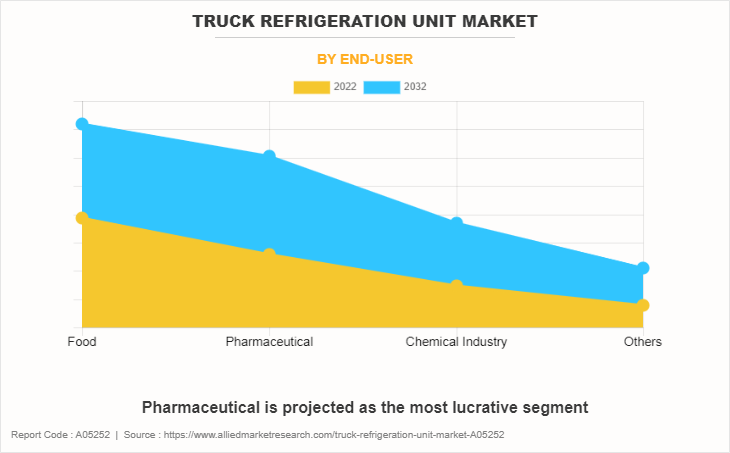
Environmental Effects of Refrigerants Used
In truck refrigeration unit industry, the role of refrigerant is very important. These units employ different coolants including HFC refrigerants, CFC refrigerants, and HFO refrigerants to enhance the cooling performance. Nonetheless, these refrigerants are inimical to environmental sustainability and could cause ozone depletion. They also have global warming potential (GWP). To provide just one example, during the month of March 2022, DGFT revised India’s import policy for Hydrofluorocarbons (HFCs) from 'free' to 'restricted', making it subject to NoC (no objection certificate) issued by the Ministry of Environment Forest and Climate Change.
Also, these refrigerants impact the quality of air circulation system ecology and consumer health and safety. As a result, numerous government agencies have become involved in promulgating strict regulatory regimes to limit environmental pollution and global warming. For instance, there are Minimum Energy Performance Standards (MEPS) levels that apply to certain products including air conditioners and refrigerators in trucks and buses that must not fall below the standards set out in Australia. Therefore, truck manufacturers need to redesign their refrigeration units and use environmentally friendly refrigerants. This is likely to impact the developments for truck refrigeration unit industry.
Development of Eco-Friendly Refrigerants
The truck refrigeration unit industry also benefits from the use of environment-friendly refrigerants like R1234yf and R74/CO2 in vehicles. R744 and CO2 are each likely to attain efficiency levels superior both in terms of fuel economy as well as truck exhaust. These ought, for that matter, to be beneficial to the environment. Now that global warming and catastrophic climate change are upon us, numerous industries on a worldwide basis have turned to sustainable substitutes. Awareness about climate change is rising and refrigerant manufacturers are spending a fortune on the R & D of their own sustainable refrigerants for commercial vehicles like trucks and buses.
For example, in September 2023 Mitsubishi Heavy Industries Thermal Systems, Ltd. brought out TEJ35GAM the electric-driven transport refrigeration unit designed especially for small and midsize trucks. It is available in both the TE20/30 series of plug-in hybrid transport and refrigeration unit and the electric drive transport refrigeration unit with heat-pump heating system for EV trucks. So, this is likely to increase its adoption in all kinds of industries.
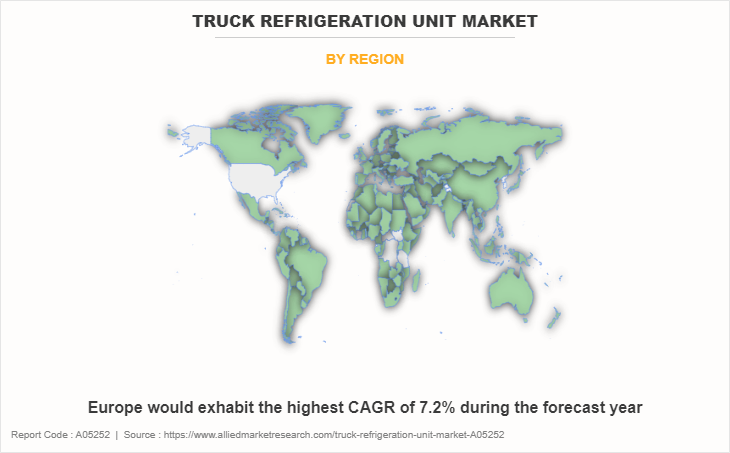
Key Benefits For Stakeholders
- This report provides a quantitative analysis of the market segments, current trends, estimations, and dynamics of the truck refrigeration unit market analysis from 2022 to 2032 to identify the prevailing market opportunities.
- The market research is offered along with information related to key drivers, restraints, and opportunities.
- Porter's five forces analysis highlights the potency of buyers and suppliers to enable stakeholders make profit-oriented business decisions and strengthen their supplier-buyer network.
- In-depth analysis of the market segmentation assists to determine the prevailing market opportunities.
- Major countries in each region are mapped according to their revenue contribution to the global market.
- Market player positioning facilitates benchmarking and provides a clear understanding of the present position of the market players.
- The report includes the analysis of the regional as well as global market trends, key players, market segments, application areas, and market growth strategies.
Truck Refrigeration Unit Market Report Highlights
| Aspects | Details |
| Market Size By 2032 | USD 23 billion |
| Growth Rate | CAGR of 6.3% |
| Forecast period | 2022 - 2032 |
| Report Pages | 287 |
| By Trailer size |
|
| By Type |
|
| By End-user |
|
| By Region |
|
| Key Market Players | Klinge Corporation, DENSO CORPORATION, Utility Trailer Manufacturing Company, LLC., Thermo King, Carrier, Subros Limited, Webasto Group, Advanced Temperature Control, MITSUBISHI HEAVY INDUSTRIES, LTD., DAIKIN INDUSTRIES, Ltd., |
The global truck refrigeration unit market size was estimated at $12,682.3 million in 2022 and is estimated to reach $22,997.7 million by 2032, exhibiting a CAGR of 6.3% from 2023 to 2032.
Asia-Pacific is the largest regional market for Truck Refrigeration Unit.
Food is the leading application of Truck Refrigeration Unit Market.
Increase in demand for advanced temperature control and monitoring systems in trucks and growth of the processed food sector and focus on reducing food waste.
Advanced Temperature Control, Carrier, Daikin, Denso, Mitsubishi Heavy Industries, Klinge Corporation, Subros, Thermo King, Utility Trailer Manufacturing Company, and Webasto Group.
Loading Table Of Content...
Loading Research Methodology...



